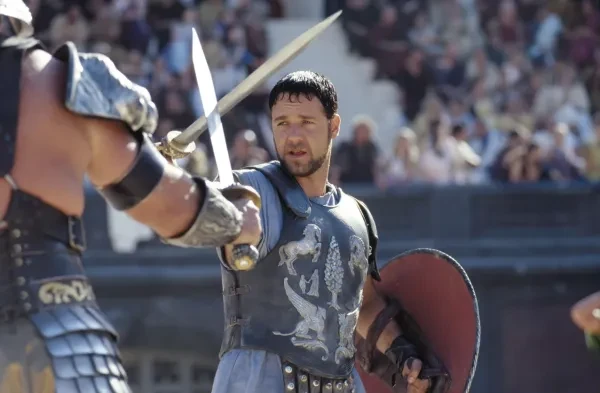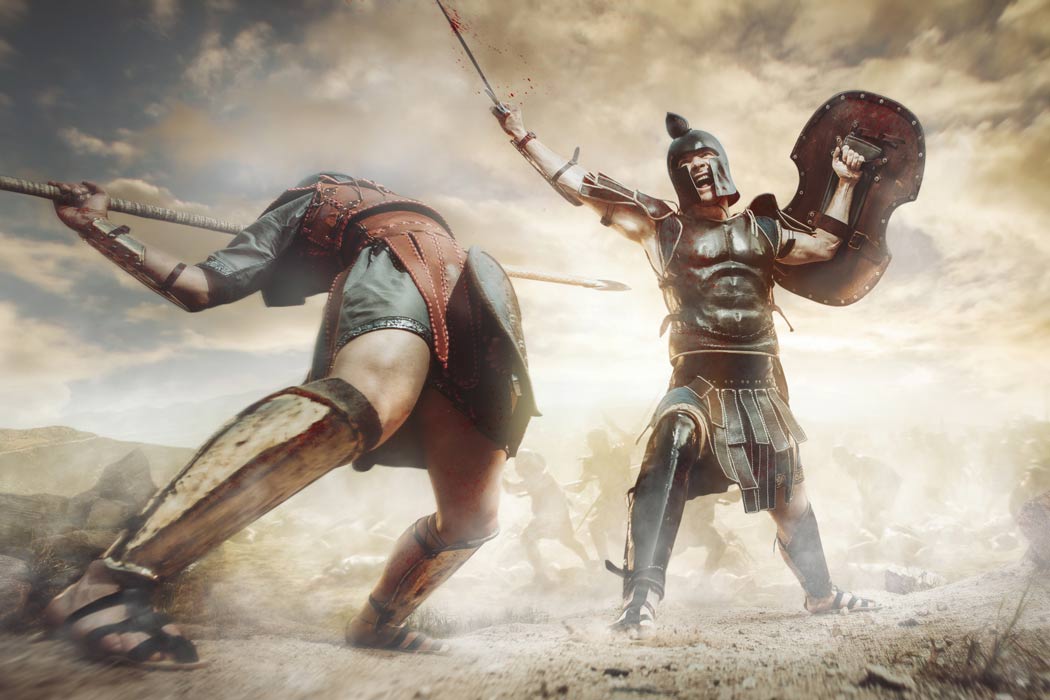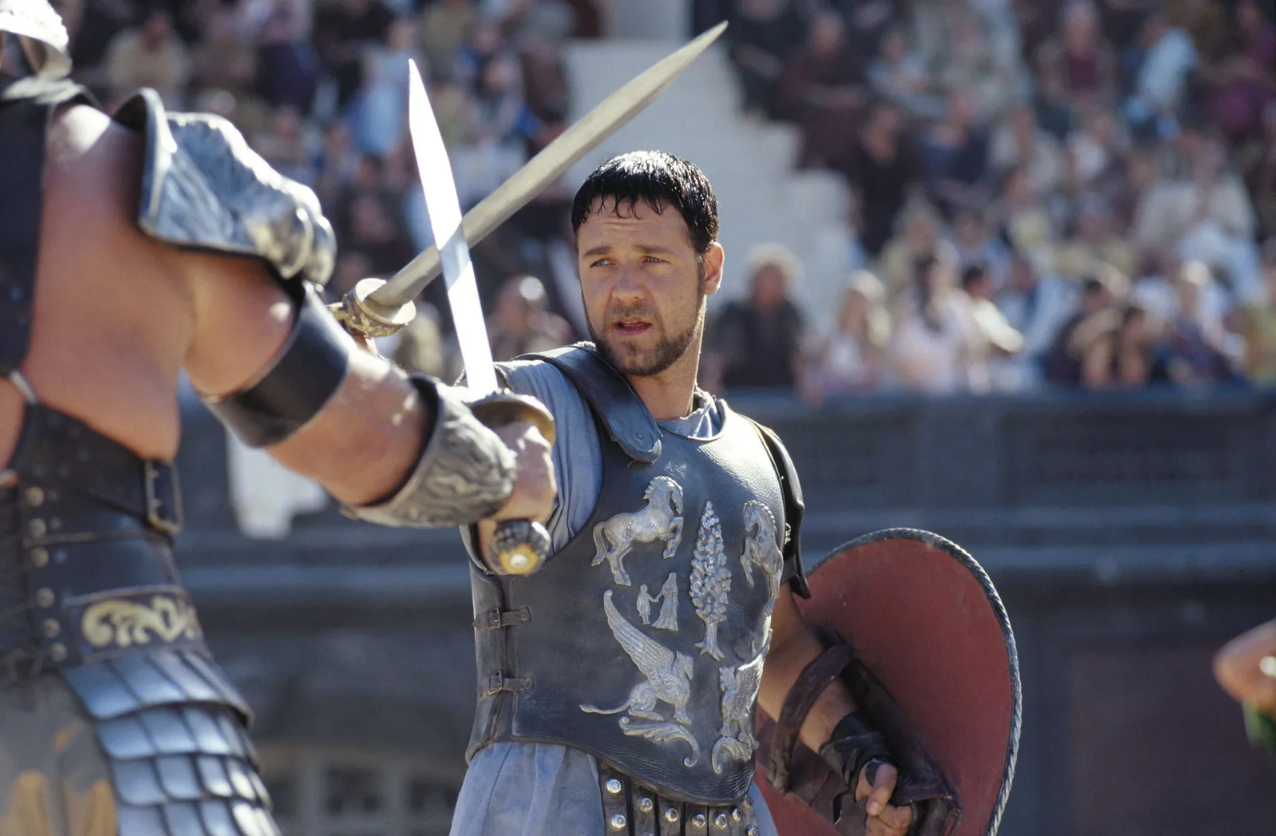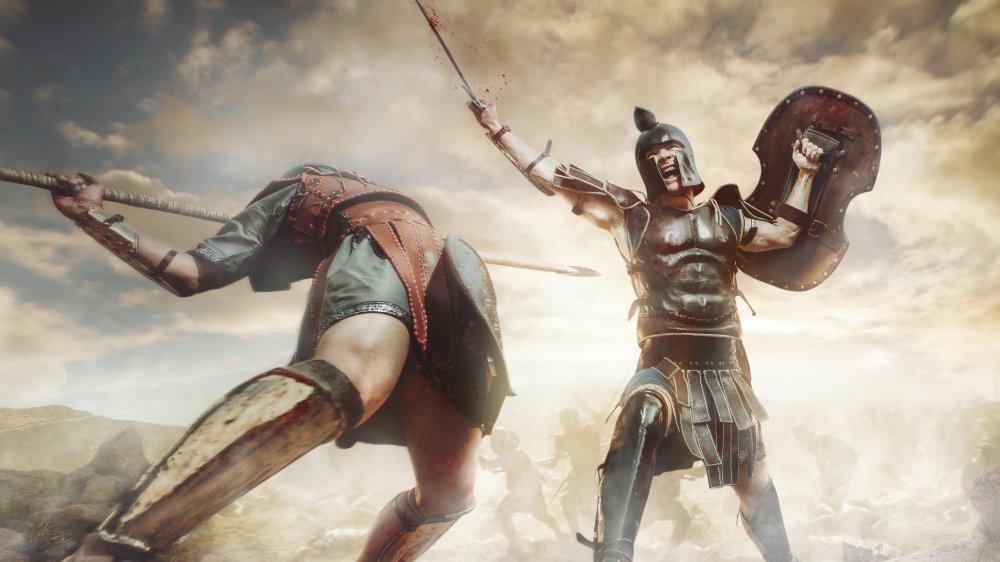
There are many stories about gladiators out there. The Roman Empire makes up a large portion of world history, and so many of their stories and histories have been carried on to the modern day. So it’s only natural that we have so many TV shows and movies about their favorite form of entertainment. The Roman people went wild for gladiators, the lower class of warriors who fought each other for money, fame, and freedom. Here are some of their best representations and stories that have lasted throughout the generations.
The Legend of Hercules (2014)
This movie begins with Amphitryon, an ancient Greek king. Amphitryon goes from kingdom to kingdom, conquering and expanding his own. Yet his wife, Queen Alcmene, hates the conqueror her husband has become. She prays to the goddess Hera in order for this warfare to end. Hera, in turn, gets her husband Zeus to impregnate Queen Alcmene. Hercules is born into the royal family and is destined to defeat Amphitryon.
Hercules grows up with his older brother, prince Iphicles, as well as his lover, Princess Hebe. One day, the two brothers encounter the monstrously strong Nemean lion, which Hercules defeats. Yet Iphicles takes the credit, and he even convinces his father Amphitryon that Iphicles should marry Hebe. While Iphicles rides high, Hercules is sent to war in Egypt. Most of Hercules’ squad is killed, and the rest are captured. Hercules is sent to the arena as a slave, forcing him into life as a gladiator. This is where the gladiatorial action begins. Hercules is sentenced to fight six gladiators, who have never before been beaten. Hercules needs to win to survive, but that won’t be the end of his problems. Even if he does win, all that awaits him is more combat in the arena, as well as his treacherous halfbrother and stepfather and the army they command. Watch to see if Hercules can escape this dark fate!
Pompeii (2014)
Pompeii opens with the Roman commander Corvus, leading his army to brutally murder a tribe of horse-riding Celts. The only survivor is Milo, a child who becomes the Romans’ slave. Milo grows up with other slaves, and is eventually sent to the city of Pompeii as a gladiator. As Milo arrives in the new city, he assists the noblewoman Cassia with her horses. Cassia becomes interested in Milo, but when he learns that she is the daughter of Pompeii’s governor, he realizes their societal classes mean the two cannot be together. Corvus, now a politician in Pompeii, sees Cassia with Milo. Corvus has been courting Cassia, and becomess enraged when he sees her with a slave. Cassia convinces Corvus not to kill Milo, but he still beats Milo severely.
Back at the arena, Milo becomes rivals with another gladiator, Atticus. Atticus is a single victory away from freedom. However, the two gladiators are sentenced to a historical reenactment, which is nothing more than a glorified execution in gladiator games. Milo and Atticus use their fighting skills and manage to survive, and Atticus realizes that the Romans will never grant him actual freedom. The victory of these gladiators turns Corvus sour. He begins to threaten Cassia, and sends his own elite guard to deal with Milo and Atticus. Mount Etna, meanwhile, starts to rumble. Milo needs to rescue Cassia, Atticus wants to earn his freedom, and the earthquakes caused by Etna become fierce. The only way to find out how this all ends is to watch yourself!
The Eagle (2011)
Marcus is accompanied by Esca, his slave. Esca hates Rome for what they did to his people, but he owes Marcus his life. This causes him a strong loyalty to Marcus that outweighs his hatred for Rome, so he helps his master follow rumors of the standard. The rumors led them to Esca’s people, the Seal tribe. In order to gain their trust, Esca pretends to have captured Marcus as a slave. The two are welcomed, but Marcus is treated cruelly by the tribe. But Esca cannot hide his loyalty any longer, and admits that he is on Marcus’ side, and they escape and find the standard. But they are surrounded by warriors of the seal tribe, including their chief— Esca’s father.
While Marcus is the master of Esca, there is more kindness between the two than between the average slave and master. The two have genuine compassion for each other. But now, their fathers and their people are coming between the two. Will their friendship last through the battles to come? Will Marcus restore honor to his family, and will Esca ever be freed?
Centurion (2010)
During the failing invasion of Britain by Rome, the Centurion Dias is captured by the British. Many other Roman prisoners were killed, but Dias is kept alive due to his ability to speak the language. Dias is interrogated by King Gorlacon, the uniter and ruler of the northern tribes. Dias somehow manages to escape. He rejoins his fellow Roman soldiers in a new assault, but once again they face defeat. Their commander is captured, and only a small group is taken prisoner. When this ragtag crew manages to escape, they go to free their commander. The commander sees little hope in this situation, and demands that Dias and his friends retreat back to their main force. As they escape, one of the crew kills the son of King Gorlacon. The king sends an elite force to hunt down this crew as revenge for his son.
With their enemies in pursuit, this crew now flees. If they manage to get back to Roman lines, they may be able to warn their allies about King Gorlacon and his forces. But the crew is quickly split up, and loyalties are tested. Will the crew make it back to Rome?
Ben-Hur (2016)
Judah Ben-Hur is a Jewish prince who grows up with his adopted Roman brother Messala. Tensions rise in their family when Messala becomes romantically interested in Ben-Hur’s biological sister, and their mother finds this unacceptable. She sends Messala off to the Roman army, where he is victorious and celebrated.
Back in Jerusalem, a political movement forms; the Zealots are Jews who are fighting Roman rule. While Ben-Hur disagrees with the Zealots, he harbors a young injured zealot, Dismas, in order to convince him otherwise. Unaware of the zealot in his old home, Messala asks Ben-Hur to go undercover with the Zealots in order to keep them calm during the march of a visiting Roman politician. During the march, Dismas attempts to assassinate the politician, leading to the Roman army swarming Ben-Hur’s home. In order to shield Dismas, Ben-Hur takes responsibility for the assassination attempt. Ben-Hur’s family all face punishment: Ben-Hur’s mother and sister are sentenced to death by crucifixion. Ben-Hur is sentenced to become a rower in a prison galley, that will go to war. Left with no clue to the fate of his family, Ben-Hur spends years as a rower, helping the Roman war machine. If you want to know if Ben-Hur escapes or how the conflict between two brothers ends, you’ll need to watch Ben-Hur.
Demetrius and the Gladiators (1954)
Our protagonist Demetrius is a devout Christian who sees that his country is starting to persecute people of his faith. He attempts to hide a valued possession, the Robe of Christ, and barely manages to before he is sent to the arena for false claims of assaulting a centurion. There, he trains for combat, but remains faithful to both his wife and religion. Fights against wild animals are essentially a death sentence, as gladiators are not expected to survive. Yet Demetrius manages to beat a pack of wild tigers. And true to his religion, Demetrius never kills another man. Demetrius is then visited by his wife, but Emperor Caligula does not want Demetrius distracted from fighting. Demetrius’ wife is ambushed by five gladiators and killed. Demetrius abandons his faith, and will soon face the same gladiators who killed his wife. How will this once devout man escape from his rage and the upcoming battle?
Spartacus (2004 miniseries)
This miniseries begins with a Gual woman named Varinia. Varinia is narrating this story to her son, and she tells him the story of her people. Her village was attacked by Romans, and her people were taken as Roman slaves. The focus then shifts to the Roman mines. These mines were worked by the slaves of Rome. When a slave is punished, Spartacus attempts to protect him. This leads to his own punishment. Spartacus is nearly crucified. Due to his fighting nature, Spartacus is instead purchased. Spartacus and his fellow slaves are bought to be trained as gladiators. Soon, Spartacus will be seen by some as a leader and others as a threat. To watch Spartacus’ rise to fame and power, watch the series and find out.
Cabiria (1914)
Back above the surface, tensions are reaching breaking points between Rome and Carthage. Croatia desperately searches for Cabiria as war erupts around them. Will Cabiria be sacrificed?
Colosseum: Rome’s Arena of Death (2003)
Spartacus (1960)
In another movie based on the life of Spartacus, we once again start with the Thracian mining slave being punished for disobedience. When a gladiator owner sees Spartacus’ ferocity, the owner buys him and brings him to the arena. In a match, Spartacus’ opponent disarms him, but when he is ordered to kill Spartacus, the opponent refuses. That gladiator attacks the officials, but is killed. Chaos ensues, and Spartacus and his fellow gladiators are able to overwhelm the guards and escape. Spartacus is elected their leader, and the group makes their way out of Rome. They loot towns and gather more slaves until their group is the size of an army. Now, Spartacus is big enough to be considered a threat by the state. With a target on his back, Spartacus will need to be both clever and strong if he wants to keep his freedom.
300 (2006)
Spartacus (2010, TV Series)
Compared to other media, this TV series is able to go into more depth about Spartacus and his origins. We begin with an unnamed Thracian man. He is convinced to enlist in the Roman army by Glaber, a Roman commander. He is convinced since both Thrace and Rome are enemies with the Getae, a people who constantly attack the Thracians. But Glaber decides that there is no glory in fighting the Getae, so he takes his army to fight the Mithridates in Asia Minor. The Thracian feels betrayed by Glaber, and leads a mutiny to escape. When he returns to Thrace, he discovers that his village has been completely destroyed during his absence. Glaber then captures the man and his wife. The man is condemned to die as a gladiator, while Sura, his wife, becomes a slave. The man is shipped to Italy to begin his training. He kills the four gladiators who were sent to execute him, which makes him massively popular with the crowd. The senator in charge of the man decides the Thracian would be an excellent gladiator, and names him Spartacus, in reference to a ferocious Thracian king of the same name.
Spartacus adapts well to his life as a gladiator. He gains an ally in Varro, a Roman who joined to support his family. He also has a rival in Crixus, a Gaul who is undefeated. He eventually tracks down his wife, Sura, and she is delivered to him. But she comes back mortally wounded and dies soon after reuniting with Spartacus. Soon, Spartacus realizes that Sura was wounded by the gladiators’ master, Batiatus, in order to keep Spartacus focused on fighting. Spartacus is no longer content with life, and soon will come into conflict with Batiatus and the Romans in charge.
Gladiator (2000)
Maximus is a general returning home to Rome. He meets with the Emperor of Rome, who tells Maximus that he should be the next emperor. The Emperor’s son, Commodus, is unfit for leadership. But Commodus hears him, murders him, and appoints himself the new emperor. When Commodus requests that Maximus swear loyalty, Commodus refuses. Commodus then sends his men after Maximus, but Maximus kills his captors and escapes. Maximus goes to his family, only to find his son and wife crucified by Commodus’ men. Maximus, injured from his prior battles and in the depths of despair, collapses. Slaver traders capture Commodus, and he is made a gladiator. Commodus, in honor of his departed father, declares 150 days of gladiatorial fights.
In an opening brawl, Maximus leads his side to victory. He then removes his helmet, revealing himself to Commodus and declaring his intent to exact revenge. The audience loves Maximus, so Commodus cannot explicitly execute Maximus without losing favor with his people. This sets up the conflict between the two men. If Maximus can continue to win, he can gain enough popularity and loyalty from others. But now that he has revealed himself, Commodus can send in nastier threats for Maximus to face. Maximus must rely on his combat skills if he hopes to take his revenge.
Spartacus: Gods of the Arena (2011 Miniseries)
This miniseries serves as a prequel to the Spartacus (2010) series, so it does not actually follow Spartacus himself. This series follows Gannicus the gladiator, and heavily features Gannicus’ owner, Batiatus. Batiatus runs the gladiator school owned by his father, and seeks glory there by purchasing spectacular gladiators. In the school, Batiatus runs into some familiar faces from the Spartacus series, like Crixus the Gual. Batiatus faces foes above his pay grade, due to the manipulation of foes. And on Batiatus’ side, he faces many rich, greedy gladiator owners who will resort to underhanded means to get their hands on Batiatus’ gladiators. At the end of the first episode, Batiatus is horribly beaten after refusing to sell Batiatus. This is just a small omen of the cruel goings-on both inside and outside of the gladiator arena.
Rome (2005, TV series)
This final show has a much larger scope than any other of the previous tales. Rome focuses on major events and people throughout the Roman Empire. Its first season follows Caesar through a civil war, his rise to power, and his eventual assassination. The second watches Octavian— who will eventually become the first Emperor of Rome— and his battle with Mark Antony for control.
The show is also seen mostly through the eyes of two characters, Titus Pullo and Lucius Vorenus. These men were common soldiers in the 13th Legion, though their legion was eventually destroyed in battle. Pullo, unsure how to use his brutish strength and battle prowess, becomes an assassin for hire. He is eventually caught for these crimes and is condemned to die in the arena. Lucius watches Pullo refuse to fight his executioners until one of them insults the 13th legion. This sparks an angry fire in Pullo, who kills his executioners. More and more gladiators are sent out to kill Pullo, who is eventually worn down. Lucius, seeing his comrade fight bravely for the honor of their lost legion, joins the fight and frees Pullo. This moment cements the bond between the two soldiers, but this is far from the last threat they will face. Rome is full of treachery and war, and they will face some foes that cannot be fought with a sword and shield.
You may also be interested in:
- Top 10 Most Powerful Gods in Greek Mythology (Ranked)
- 15 Most Frightening Greek Mythology Creatures
- Top 10 Best Greek Mythology Games
- Top 12 Gladiator Games Where You Fight to the Death
- [Top 15] Greek Mythology Monsters And What They're Famous For
- [Top 15] Greek Mythology Goddesses And What They're Famous For
- [Top 25] Best Greek Mythology Movies To Watch Right Now



